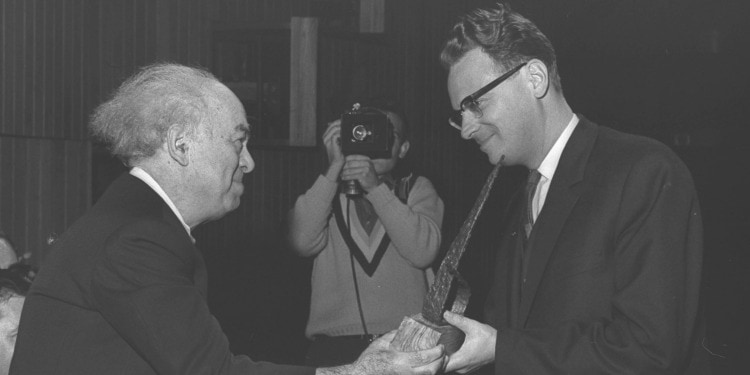‘One Young Goat’
The Fellowship | August 23, 2019

Ephraim Kishon
August 23, 1924 – January 29, 2005
Born Ferenc Hoffman to a Jewish family in Budapest, Hungary, Kishon didn’t learn Hebrew or Yiddish as a boy. However, his writing talents became obvious at an early age, as he won a prize for writing a novel in high school. But because of the Nazis’ anti-Jewish laws during WWII, he could not study at a university.
During the war, he was imprisoned in several Nazi concentration camps. In one of the camps, Kishon’s gift at playing chess saved his life, as he befriended the guards over the camp chess board. In another camp, the Nazis lined up the Jewish prisoners and shot every tenth one, but Kishon was passed by. Later he would write: “They made a mistake—they left one satirist alive.”
Being transported to the Sobibor extermination camp, he was able to escape and spent the rest of the war laboring under the Slovakian pseudonym Stanko Andras. When the war ended, he returned home to find that his parents and sister had also survived, while most of the rest of their family had died in the Auschwitz gas chambers.
In 1949, he escaped then-communist Hungary and made aliyah (immigrated) to the newly formed modern state of Israel. There, Ferenc Hoffman officially became Ephraim Kishon.
Kishon first lived in a transit camp near Haifa, then on a kibbutz, where he worked as a nurse and learned Hebrew. He soon became proficient in the language of his people and homeland, but his thick Hungarian accent never went away.
After only two years in Israel, Kishon’s Hebrew was good enough that he began writing a column in the daily newspapers, Omer and Davar. He also published his first book, The Pestering Immigrant, which was about the experiences of new olim (immigrants to Israel) during the 1950s. In 1952, he began writing a column for the influential Hebrew newspaper Ma’ariv. The column was called “Had Gadya,” which means “One Young Goat” in Aramaic, and is taken from the Jewish Book of Passover. Kishon wrote the column for 30 years, publishing a new piece nearly every day.
Kishon was a popular writer, but often felt he was treated unfairly because of his right-wing politics. But that didn’t stop him from having his books translated into 37 languages, writing many plays, and directing multiple films that were nominated for Golden Globes and Academy Awards.
Ephraim Kishon died in Switzerland at the age of 80, and his body was flown back to Israel, the adopted and biblical homeland that he so loved.
